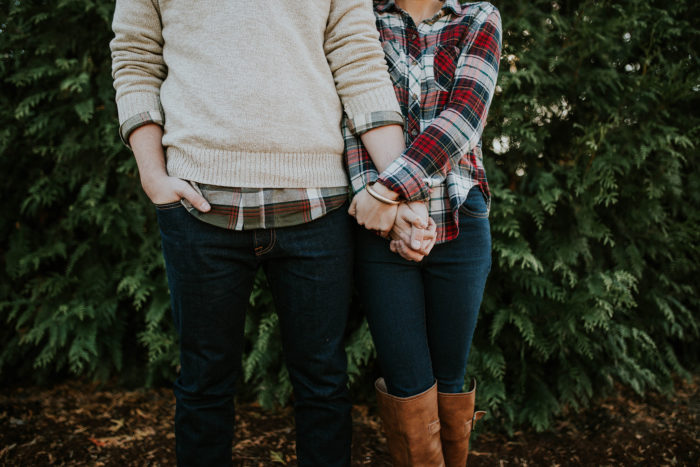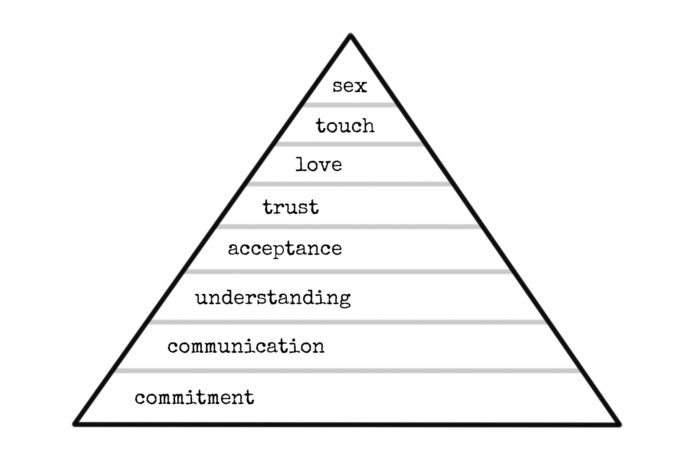The social norms of relationships change every generation. The lines between acceptable and taboo are constantly evolving. Despite whatever form they take, I think the heart of relational health is still fairly universal.
We want connection.
We want to build relationships that will help us grow to be the best version of ourselves, allow us to be generous with our love, and recognize any red flags of incompatibility or dysfunction. With any luck, that’s exactly where the dating journey takes you.
We want to learn to love
and be loved in return.
Before the journey begins, it’s good to ask ourselves if we’re happy with the depth of our emotional health and feel secure within our own identity. We are attracted to people of similar levels of relational health. In other words, how we start a relationship sets the tone for the path ahead.
Partially inspired by some insights in the book Datable, these six truths helped me navigate the confusing dating world as a young man. Maybe they’ll be helpful to someone in your life too.
1| You will break up.
Everything ends.
When we’re in the middle of a loving and satisfying relationship, we can’t imagine it ending, but it’s always there. Denying the inevitable end of something doesn’t make it less painful when it does come. It just makes us less prepared and less capable of choosing what leads up to that end.
The end of the road for all dating relationships is to 1). break up or 2). get married. Even the best marriages or committed life-long relationships are only until “death do you part.” At some point, we have to say good-bye… even to those we love most.
But this isn’t all bad news.
If we don’t treat the end as a surprise or failure, we’re less interested in blaming our partner or trying to get even, and more interested in our own integrity and the agency of our choices. Embracing the end as a natural part of the life cycle better helps us choose what we actually want while our relationship is alive.
2| Ending relationships well becomes the priority.
Accepting all good things end doesn’t mean all break-ups have to end with one or two people hurt, angry, and bitter. How different would your relationship be if the end goal was to always leave on good terms? Would this guide you into better choices during the course of your relationship? What do you need to do to ensure your partner leaves feeling dignified, respected, and honored at the end of your time together?

If you have the end goal in mind, it clarifies the road ahead of you and the choices you need to make in order to reach that goal. Would this help us make wiser relational investments? I think it does. The greatest gift you can give the one you love is to prioritize caring for their heart.
3| The More You Invest, The More Hurts.
The more of yourself you give to another person, the more it will hurt when your relationships ends. The more we invest, the more pain we will go through. Such is the nature of love. Of course, that doesn’t mean avoiding pain is the answer. It reveals how import trust is to the health of our relationships.
It’s good to remember you don’t have to rush anything. You can take your time learning about each other, discovering one another, and building trust. You get to decide who is worth your investment and how much you give.
4| Physical intimacy accelerates connection.
Physical intimacy speeds up the rate at which you make relational investments. By the time we add the complexity of sexual intimacy to a relationship, we hopefully already have the relational building blocks to support it. Has your partner earned your trust and confidence? Have you earned the trust your partner needs? It all ties together. When we know how much we invest into a relationship equals how much it hurts when it ends, we’re free to make our own decisions. We choose if this person worth the risk of getting hurt over.
How do you know when you and your partner are ready for sex? Years ago, a mentor of mine put together a loose framework of building blocks to understand how healthy connection can be cultivated. I still think it’s helpful today.

At the beginning of a relationship, we establish a commitment or decision to make ourselves available to another person. We give them our time. We give them access to ourselves. We then start exchanging thoughts, feelings, and ideas with them. We begin to understand who they are. If we have learned to understand another human being, then our acceptance of them is even more meaningful. Many of us fear if we were truly known, we would be rejected. But the opposite is usually true. To be known, understood, and accepted is a beautiful, life-giving gift.
Trust begins to grow, which establishes the stable foundation for love to thrive. Love, “ascribing infinite worth to someone else” as defined by Greg Boyd, is the free flowing energy of giving and receiving between us. From there, touch and sex are natural expressions of our unfolding affections. Even with more casual and liberating views of sex, no one wants to be touched by someone they don’t trust. That’s a recipe for sexual abuse. Manipulation is not consent.
Which brings us to the importance of character.
5| Character matters, Always.
Red flags are warnings we get when we need to pay attention to core character issues. It’s possible to fool people for awhile, but sooner or later you can’t pretend to be someone you aren’t at the character level. Character is the etching of who you are into your soul.
“You are what you love.”
—James K.A. Smith
If we’re honest, we know some people aren’t yet capable of loving anyone in return. Some have big holes in their heart that suck up all the love you have to offer but still have never enough. Some are experts in gaining other people’s trust to control and manipulate so they can feel secure. Sometimes these issues are unconscious or hidden from the person themselves, and our relationship together helps bring these issues to the surface.
Some people have experienced suffering and allowed it transformed them into deeply empathetic souls. Some people are still kind when no one else is looking. Some people are fountains of love and generosity because they are confident in who they are and found access to an infinite source of love. Some people are amazing, inspiring, revolutionary individuals.
Discovering the character of someone is a journey.
What kind of person do you want to be with? What kind of person wants to be with you? We almost always find what we are looking for. The best in you is attracted to the best in me and the worst in me is attracted to the worst in you.
6| LovE SOMEONE because of who they are, not Because of how they make you feel.
When we started dating, my wife told me she didn’t want to love me because of how I made her feel. She wanted to love me because of who I am— my character. She laid down some clear boundaries to not take advantage of her attraction to me. I could have, and done so without even knowing I did, if she wasn’t so courageous. I’m so grateful for her vulnerability and wisdom in that moment.
Building sturdy foundations help ensure we aren’t getting swept up in a direction we don’t actually want to go. We don’t want to confuse what feels right or good in the moment with what helps us temporarily cope but creates a pattern of dysfunction in the process. We want to choose the one we love with a clear and sober mind.
Aren’t we all looking for someone to sincerely say something like this to us? “I know exactly who you are. And I choose you. You’ll change and grow, just like me. I don’t know what the future holds for us, but I’m confident you’re worth the risk.”
If you’ve made it through to this point, you have some amazing ingredients to grow and nurture your dating relationship together. I hope you and your partner discover or continue to deepen the connection you’ve always wanted with each other. Marriage may or may not be the right next step for you, but if it is, here’s my last bit of advice.
If your relationship can effectively communicate, fight fairly, and can follow through on a commitment, you have the groundwork for a satisfying connection that’ll endure through a lifetime.
In the midst of life’s greatest challenges, may you find one of its greatest treasures— to know, by intimate experience, how to love and accept being loved in return.
0 Comments